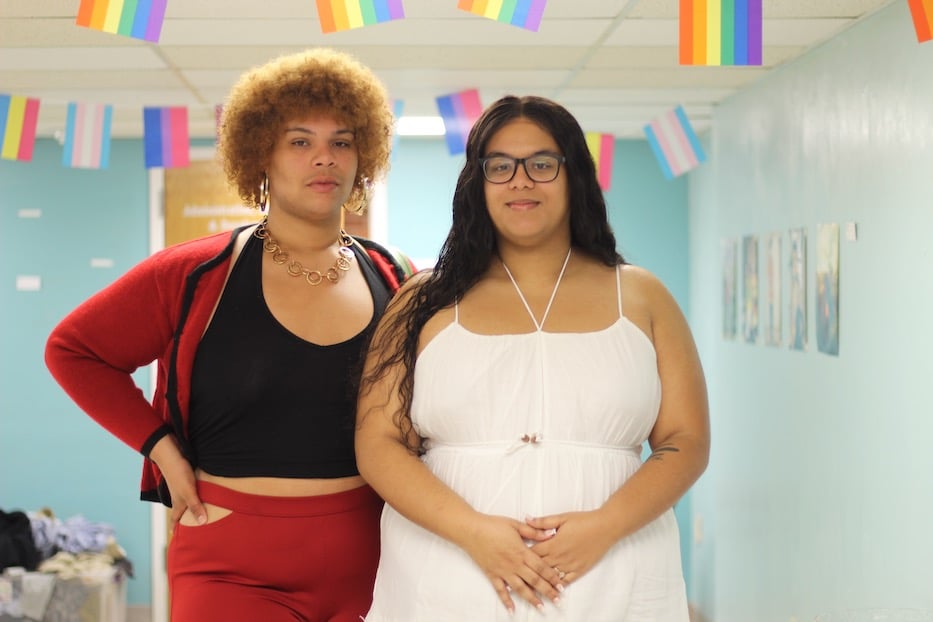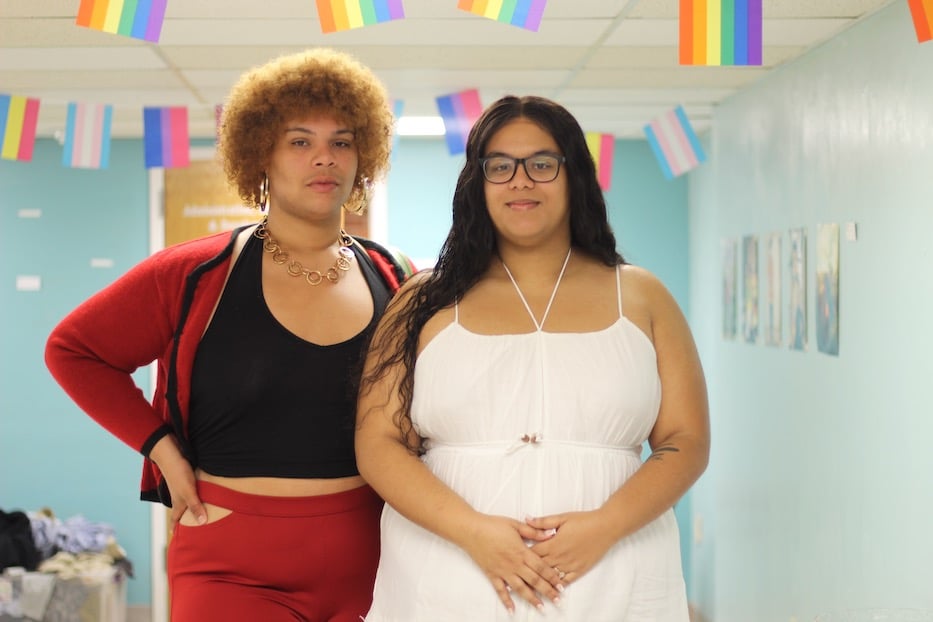
Culture & Community | LGBTQ | Politics | Arts & Culture | New Haven Pride Center | Citywide Youth Coalition | Arts & Anti-racism

Erycka Ortiz and Alyssa-Marie Cajigas Rivera Ortiz. Lucy Gellman Photo.
When Alyssa-Marie Cajigas Rivera Ortiz walked into Black and Brown Queer Camp for the first time six years ago, she didn’t know that it was setting her on the path to statewide organizing. Now, she’s leading an effort to amplify queer and trans voices across Connecticut—and remind the state how much work it still has to do.
Rivera Ortiz is the co-executive director of the Children of Marsha P. Johnson (CMPJ), a new grassroots collective focused on the activism, organizing, and liberation of Black, Brown, and Indigenous queer and trans women across New Haven and the state. Launched in January of this year at Possible Futures, the group seeks to center youth organizing and hold municipal and statewide systems of power accountable.
It is co-led by Alyssa-Marie Cajigas Rivera Ortiz and Erycka Ortiz, a field organizer for the ACLU of Connecticut who serves as the collective's director of organizing. Rivera Ortiz, who also serves in development at the New Haven Pride Center, is the director of operations. In addition, the CMPJ team includes Membership Coordinator Jamila Washington, Executive Secretary Tatyana Colón, and Program Associate Dave John Cruz-Bustamante.
The spark for the group happened over five summers ago, when the first Black and Brown Queer Camp—then called the Children of Marsha P. Johnson—rolled into the New Haven Pride Center for the first time. A recent graduate of High School in the Community, Rivera Ortiz was 18, and had already emerged as a voice in citywide organizing and advocacy efforts in New Haven. At Queer Camp, she saw a template for the work she wanted to grow.
The collective is named after Marsha P. Johnson, a Black trans activist who is often recognized as a mother of the queer liberation movement in the United States. In 1969, she was present at the Stonewall Inn on June 28, the night of what became the Stonewall Riots. In some historical accounts, she is remembered as throwing the first brick at police.
“I don’t think at that time, either of us saw it growing into what it has,” Rivera Ortiz said in a recent interview with Ortiz at the New Haven Pride Center. “But then we knew that we had to create a safe space for queer, Black, Brown and Indigenous young people to organize, to be together, to feel, to share space and to share culture.”
Since that time, she has returned to queer camp as a masterful facilitator, grown the summer program into a celebratory week-long affinity space, helped produce a conference for hundreds of LGBTQIA+ youth in New Haven, and pushed for systemic and legislative change at the grassroots, on the municipal level, and in the state legislature.
Both she and Ortiz are quick to say that none of the work happens in a vacuum: CMPJ members have been deeply influenced by the work of fellow New Haven organizers Ala Ochumare, Juancarlos Soto, Ta’LannaMonique Miller, MiAsia Harris, Mellody Massaquoi, and many others, as well as the Boston-based Combahee River Collective.
CMPJ, she and Ortiz said, is a direct extension of that foundation. After starting the organization last year within City Wide Youth Coalition, the two have grown it to a $450,000 operation, thanks largely to the support of donors and a few individual supporters. That’s not far from their goal of a $700,000 annual operating budget, Rivera Ortiz added. She and Ortiz are also already thinking about collaborators: they are currently working on a project with Arvia Walker of Heaux Bag Co.
This summer, the group plans to hold an expanded version of Black and Brown Queer camp, at a yet-to-be-announced location. Applications for the group’s inaugural Sylvia Rivera Leadership Program are also open. In the next year, the two intend to pursue 501c3 nonprofit status for the group.
“I am just amazed by these two individuals that I have the honor of just like, being in the orbit of,” said New Haven Pride Center Interim Executive Director Juancarlos Soto. “I feel like a proud dad. I’m just trying not to cry here.”
Recently, the Arts Paper had the chance to sit down with both co-executive directors to talk about the mission, vision, and hopes for CMPJ as it charts a path forward. An edited version of that interview is below.
So I listened to the panel conversation on Trans Day of Visibility earlier this month, and I want to start there. Can you tell me what anarchal Black feminism is?
Alyssa-Marie Cajigas Rivera Ortiz: Anarchal Black trans feminism has a long history and a long school of thought, of many pieces put together by different Black scholars that do movement work. For us, I think we were very clear in like, whatever is this lens or analysis, we have to know how to actually put it in practice.
What that looks like in our organization is the centering of Black women in leadership. It’s how we show up in community, and it’s allowing [the] community to hold us accountable when we show up in ways that are harmful. It has to be anti-bias, anti-racist, anti-capitalist, anti-white supremacy, so there are some very clear boundaries in what it sets for what we’re organizing for or against.
Erycka Ortiz: Anarchal Black trans feminism is also making space for the ways in which we address conflict in a more holistic way, and making space for it. The reality is, when you’re creating spaces that are deeply liberatory, that are intersecting of all our identities, and that center us, conflict will arise. It’s natural. Especially when there’s more than one person engaging in the same school of thought. I think that’s extremely important, because there has to be a million and one ways for us to do something.
When you get a bunch of Black and Brown people in the room, we kind of experience all at once needing to talk, and needing to be heard. We kind of yell over each other, because in those spaces, we know that when we leave, we have to go back to our corporate jobs. We have to go back to institutions that do not listen. So when we’re in spaces where it’s like, “Oh, we see each other,” you gotta like, you gotta hear me. That lens and analysis is a way to hold space for that. We’re humanizing each other to be heard. We have to be able to redefine and really understand conflict.
So what does that look like in practice, knowing that this is still very young and very new?
Erycka Ortiz: Organizing is our code of honor. It’s a commitment. It’s what we’re called to do. It’s the responsibility of the people. So for me, it’s really about going back to the drawing board and saying: How can we truly develop something long-term? What is our code of ethics and cooperation and community? What are our community ethics? What are our love ethics? What does that mean to create that for ourselves?
We’ve gotta be able to hold integrity in naming that my liberation might sound very different next to yours in a short-term sense. Sometimes, one person’s liberation is just being left alone in the morning or having that glass of water. Also, being able to really centralize that is deeply important to us. So again, going back to the drawing board of: what are we actually putting into our political education? We’re starting at young people developing their own community ethics.
Since you mentioned it, is part of the thought also advocacy around proposed legislation? This year, we saw anti-choice and anti-trans legislation in Hartford, even though it did not make it out of committee.
Alyssa-Marie Cajigas Rivera Ortiz: Yes! Advocacy and organizing are going to be the two biggest components to our work moving forward. Like you said, Connecticut is this very purple state, and we need to get ready for what’s ahead. I think this year was a huge signal to those of us on the ground that there is more to come, and we need to be ready for that.
You know, the reality is that in this moment, there isn’t an organization out there that is actually doing queer organizing or queer advocacy work specifically, so we hope to be one of many as the years come. It’s gonna take a lot of people power to really stand up against the very real hate that is headed our way, and already here.
What are you seeing right now? From the outside, it feels like there is this reactionary moment that we are in. It’s like tiny steps forward, and then both Republicans and moderate Democrats are like “Oh no, I’m gonna push you back.”
Alyssa-Marie Cajigas Rivera Ortiz: I think the reality is that moderate Democrats in Connecticut have been heavily aligning themselves with more far-right ideology. We saw it with the [proposed] ban on “Latinx” bill this year, and all of those Democrats who signed on.
We had conversations with some of them, and a lot of them were like, “We didn’t even know what we were signing up for.” So I think the other issue is that there’s a lack of due diligence from legislators to make sure they know exactly what they’re signing up for and the harm that they’re potentially causing to our community. The reality is just that the mere thought, the introduction of these bills is quite harmful.
Is Queer Camp also a pillar of CMPJ?
Alyssa-Marie Cajigas Rivera Ortiz: Yes! So Queer Camp will remain one of our key programs moving forward, and this year we plan on expanding it way more than it has been. Queer Camp will probably be one of our main programs to expand beyond Connecticut.
So how does this work on a statewide level? Sometimes, Connecticut is so small, and yet coalition building in the state feels so hard. Like, mind-numbingly hard.
Erycka Ortiz: With our coalition building work, we’re taking lots of time to think about it. We’re really trying to comprehensively build out what our coalition competencies really look like.
We’re very excited about collaboration. CMPJ is not here to compete, or to say that we want to do everything.There are folks that already exist that do this work, and we are trying to deeply focus on like, in all of this collective of what’s happening, what is not happening that we can focus on?
There are no political agendas that center Black and Brown, trans, queer, nonbinary folks. And also, for folks that are doing the work, what are the ways of collaboration and support?
There’s also other ways of engagement of how to support here. It doesn’t just end if you aren’t able to show up at the capitol building. It also is like, are you still engaged to send something to your base? Can you send this to your social media? Can you slap your logo on and cosponsor? There are really low levels of engagement that are just as relevant and necessary and integral.
Learn more about the Children of Marsha P. Johnson here. On Wednesday May 3, The Children of Marsha P. Johnson, Citywide Youth Coalition, and the New Haven Pride Center will be hosting a “Banned Book Reading Hour and Giveaway” at Possible Futures from 12 to 1:30 p.m.

